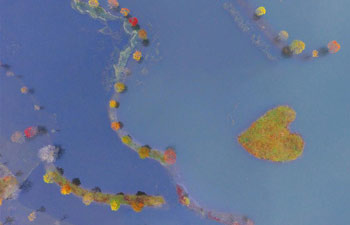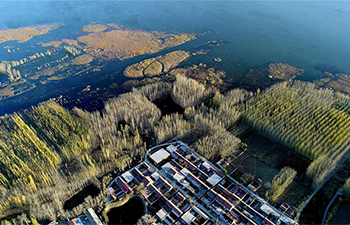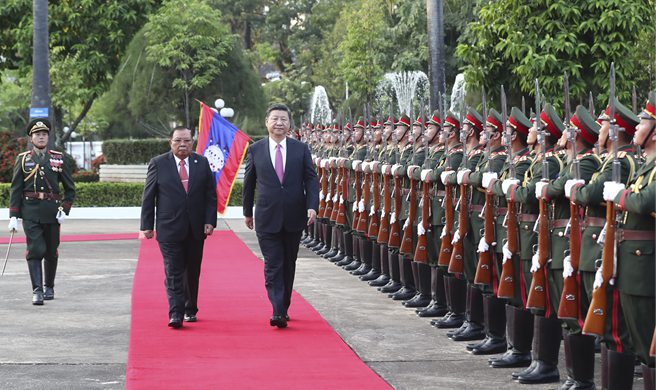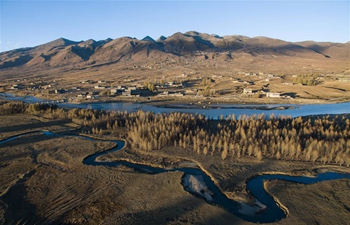by Christine Lagat
NAIROBI, Nov. 14 (Xinhua) -- Mushawa Ndoro has nostalgic memories of listening to folklore from his ancestors who migrated from Zimbabwe and settled in Kenya in the early 1960s when the east African nation was gaining self-rule.
The 48-year-old carpenter belongs to the second generation of Zimbabwe's Shona people who left their ancestral homes to spread African themed Christianity in Kenya and its neighboring countries.
Ndoro's forefathers found abode in Nairobi and central Kenya where they built churches and blend easily with locals whom they share some cultural similarities.
Ndoro and his kinsmen now live in rented apartments on the outskirts of Nairobi, eking a living through carpentry, basket-weaving and small scale trade.
Speaking to Xinhua recently in Kiambu County outside Nairobi where Shona immigrants have lived for decades, Ndoro hailed the hospitality of local hosts but reiterated his desire for Kenyan citizenship to enable him to become fully integrated in the country's socioeconomic fabric.
"We consider Kenya our home since it is the country that we have lived since childhood. Our parents are also buried here and our grasp of local dialect has made it easy to interact with the local hosts," Ndoro said.
Kenya is home to an estimated 3,500 Shona people who are scattered in different parts of the country but are hard to decipher since they share physical and cultural similarities with local communities.
The pioneer Shona immigrants, though recognized by Kenya's founding fathers, were never granted citizenship, a situation that has continued to date.
Ndoro noted that Kenya has a special place among his kinsmen, though lack of citizenship has hampered their quest to be part and parcel of the country's transformation.
"Our forebears started lobbying for citizenship status 40 years ago and our generation has taken over where they left but unfortunately, our appeals have not been honored," Ndoro said.
The United Nations High Commissioner for Refugees (UNHCR) Kenyan Office and local partners have pushed for official recognition of the Shona people as Kenyan citizens.
Assistant Protection Officer in charge of Statelessness at UNHCR Kenyan Office Wanja Munaita said granting Kenyan citizenship to the Shona immigrants will enhance their contribution to economic development in their host country.
"We are seeking audience with the government on behalf of stateless people like the Shona to ensure their quest for citizenship is granted," Munaita said.
The UNHCR Kenyan Office is conducting an elaborate survey to ascertain the challenges facing the Shona immigrants in Kenya, she added.
During their half-a-century sojourn in Kenya, the Shona people have stood out due to their mastery of prized crafts such as basket-weaving, carpentry and masonry.
Juana Ncube, a 73-year-old matriarch who has lived in Kenya since 1974, said the Shona have always participated in nation-building activities in their host country, and citizenship will enable the younger generation realize their dreams without disruptions.
"We have been involved in menial jobs as well as knitting garments and weaving baskets since settling in Kenya," Ncube said. "Our appeal is for the government to recognize us as citizens with equal rights granted to the native population."
She was born in Harare, the Ethiopian capital, and together with five siblings followed their parents who had earlier migrated to Kenya to spread Christianity.
Kenya's founding president, Jomo Kenyatta, paid homage to the pioneer group of Shona immigrants whom he helped acquire a prime plot in Nairobi to build a cathedral.
During their stay in Kenya, the Shona have inter-married with local communities while pursuing different types of vocations despite lack of identification papers.
Oliver Muregerera, a 56-year-old second-generation Shona immigrant in Kenya, said the host country has provided a haven for his kinsmen to nurture their talents and explore new frontiers.
"Some of our forefathers started businesses in regions adjacent to Nairobi while others left an indelible mark in education and skills development for the youth," Muregerera said.
He regretted that the younger generation of Shona immigrants lack proper identification documents, hence their inability to access quality education and jobs.
"The majority of our youth have obtained their basic education in local schools, but proceeding to colleges is problematic due to lack of a national identification card. They can hardly find well-paying jobs because they are not Kenyan citizens," Muregerera said.
His sentiments were shared by Rufaro Kapota, a 23-year-old primary school dropout whose failure to proceed to high school was attributed to lack of identification documents and poverty in her family.
"I am still passionate about education and career development despite the challenges I have gone through while looking for a national identification card," Kapota told Xinhua.
The accomplished basket-weaver aspires to pursue a career in the performing arts and to mentor her younger kinsfolk.

















